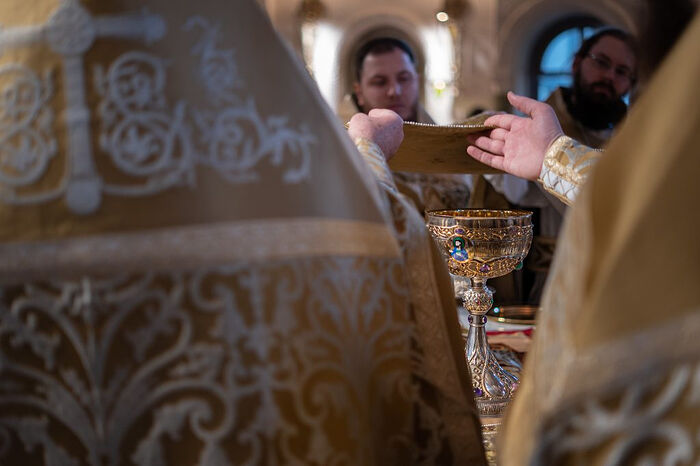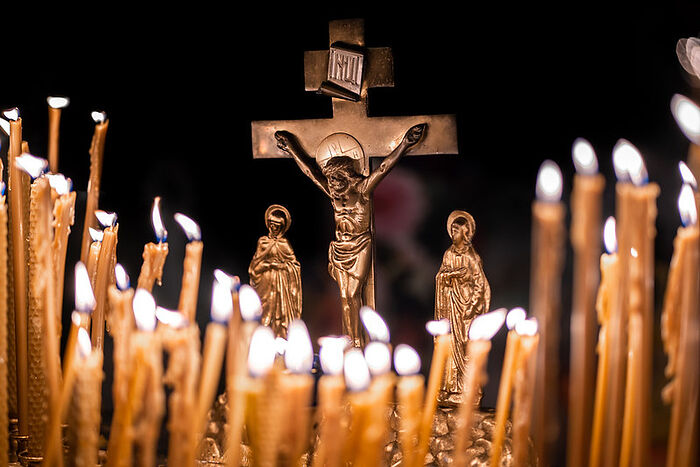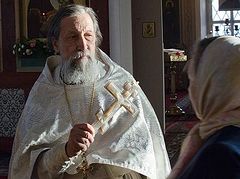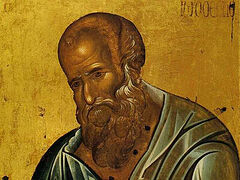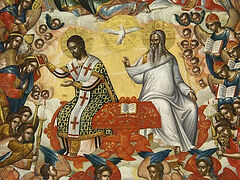Part 1A
Part 1B
Part 2A
Part 2B
Part 3A
What did Christ do for us? We read in verse six: And [He] hath made us kings and priests unto God and His Father; to Him be glory and dominion unto the ages of ages. Amen (Rev. 1:6). He made all of us partakers of His authority—He made us kings. As He is the King, so He has made us kings by grace, inasmuch as we are children of the King of kings. I want to say how deep these things are when a man lives them in God. A man who is close to God, my dears, truly feels like a king—he has no need of anything. At the same time, he may have absolutely nothing.
I remember an encounter during my second trip to the Holy Mountain that made a great impression on me. I went to the Katounakia desert where there was a hermit from Cyprus. He’s still alive, quite old already. There was a veranda in the middle of the cliffs, overlooking the sea. He told me: “I feel like a king here.” And what kind of king was he? He had nothing. His kallyva was so poor! There was nothing in it. His clothes were all torn. He treated me to some fruit and I tried not to look at what I was eating—there were five or six worms in every piece. Extreme poverty. And he tells me he’s a king!
And there are people who have everything but at the same time say they have nothing. They have a house, but they want two, three, four, five, six. They buy more and more and more. And they say: “We can’t stop. We’re not satiated. There’s something missing inside of us, keeping us from feeling complete.” When you have an emptiness in your soul, no matter what you give your soul, nothing will help if God doesn’t dwell in it. Give it money, as much as it wants; give it houses, as many as it wants; offer it palaces—it will still feel empty. But when God is inside you, you can go to the most miserable hovel and you’ll feel like a true king.
And why are we kings? Like a king who reigns and whom everyone obeys, a man who has cast aside his passions is not enslaved to his passions; he is his own king, an autocrat—he keeps himself, reigns over himself. The passions don’t lead him wherever they want; they don’t pull him off to the right or the left—irritation, sensuality, love of glory, avarice. No. He is his own lord, king, and autocrat who holds himself in check. He’s also free. Who is a free man? He who does whatever he wants? He who lives in a free land? If you’re a slave, then even if you live in a free land, you remain enslaved. And if you’re free, then you’ll be able to liberate an enslaved homeland.
If you’re spiritually free, then even in the midst of slavery, in the midst of a tyrannical regime, even if you’re sent to hard labor, you’ll be free. When your soul is free, then you’re free. And when your soul is subordinated to the passions, nothing will work out. God truly makes us kings. I’ve seen it all happen many times. What does sin turn us into? It makes us like the prodigal son who herded pigs. We become pig herders and feed upon pig food. Sometimes you see people who have left God, who have fallen in love with the vanity of this world. What happens to them! They, in fact, get lost, become slaves to their passions, to their sins; slaves to daily worries and cares. And in the end, they drop this beautiful royal majesty and become pig farmers.
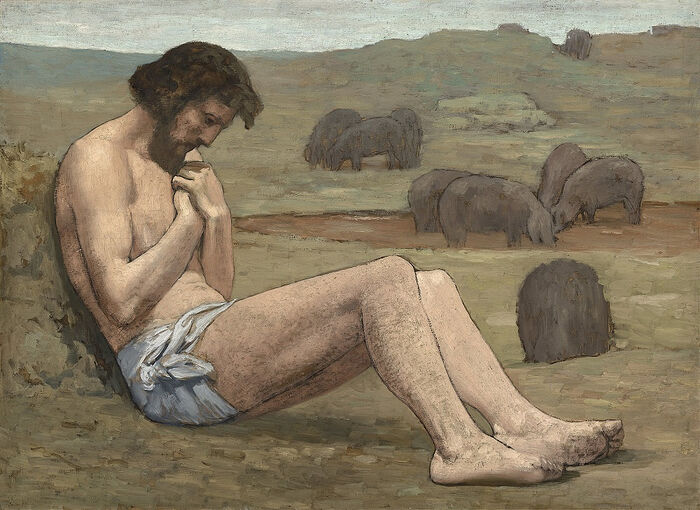 Pierre Puvis de Chavannes, Prodigal Son, 1879
Pierre Puvis de Chavannes, Prodigal Son, 1879
Christ makes us kings. Wherever you are, you always feel this royal dignity—freedom and immediacy without all the pettiness and baseness so characteristic of slaves. God makes us kings and priests. Some women complain that they can’t be priests, but there are few of us priests. But there we will all become priests—including women.
Meaning what? It’s not about holy orders. We’ll become the “royal priesthood,” celebrating the great mystery of our salvation. The rite that Christ celebrated as the High Priest on the Cross to save man is celebrated by every one of us who believes in Christ, who labors in Christ. Everyone celebrates the Sacrament of his salvation, struggles with passions and sins, and offers himself and the whole world, the whole of creation as thanksgiving to God—and through this becomes a priest of God. It is in this sense that the Apostle and Evangelist John speaks about the priesthood here.
And hath made us kings and priests unto God and His Father; to Him be glory and dominion unto the ages of ages. Amen (Rev. 1:6). To him belong glory and dominion unto the ages. To Whom? To God the Father, or to Him that loved us, as said above? Either way it doesn’t change the meaning—it could be said about the Father or about Christ. To Him, to God belongs glory and dominion unto the ages of ages, amen. Truly it is so. This is the meaning of the word “amen” in Greek—truly, so be it. Glory belongs to God, because only He is eternal. And only those who are united with God are truly glorified. Other glories, my brothers, are vain and transitory; they all come to an end. Whatever you become in this world, even the greatest king, the hour will come when it all stops. Only the glory of God never ceases. The proof is the saints whom God has glorified. The glory of the saints doesn’t fade away, but continues through the ages.
Whoever wants to be glorified must love the glory of God. And whoever desires human glory, let him know that it will end quickly and often ingloriously. How many kings have we seen, how many autocrats? Where are they all? They’re all gone. Everything is lost. Everything human is vain. Nothing remains. Earth and ashes, earth and dust. In the Book of Needs, in the funeral service, there’s an instruction for the priest: Be careful, priest, that this service be celebrated the same for all—kings, rulers, soldiers, the poor, the small, the great, the rich, the poor—for everyone. Serve the same rite for everyone, without exception. There’s no need to celebrate a special service for important people, or different services for the rich and poor. The words are the same for everyone.
Serve the entire service, which is so beautiful, so optimistic. Why is it optimistic? Because it speaks of the impermanence of things, but also of the eternal glory of God. Everything ends, but everything also begins in the presence of God. When God lays a man to rest, then he is at rest. When God remembers a man, then he exists. Therefore, we say: “May his memory be eternal.” God will remember you eternally. Only God glorifies man. And if God glorifies a man, then he will be glorified forever. Whatever God says has value, my dears—not what people, newspapers, TV, or anyone else says. All that’s a smokescreen. God will have the last word about every man, and it will be an eternal word.
If God glorifies us, we’re glorified. If God rejects us, then no human words will be able to help—no matter what people say, no matter what commemorations they arrange for us, no matter what monuments they erect to us. It’s all vanity. To God be the glory, dominion, and power. Where is human strength? No one can do anything. Everything is possible only for God, and His works extend unto the ages.
This verse ends with the words: To Him be glory and dominion unto the ages of ages. Amen. We hear them often in church, we often say, “unto the ages of ages.” Do you know how important this expression is? To be honest, I didn’t pay attention to these words, I didn’t feel them. One spiritual brother told me a story about himself. When he was ordained a priest on the Holy Mountain and he was serving his first Liturgy, as he pronounced the words: “Blessed is the Kingdom of the Father and of the Son and of the Holy Spirit, now and ever and unto the ages of ages,” after the words, “now and ever and unto the ages of ages,” God opened his spiritual eyes and he saw before him the boundlessness of eternity. If we had a telescope with enormous resolution and we could observe the depth of everything in the audience, if we could see the depths of millions of lightyears, elusive measurements!
And just think—God is outside all of this; for Him, these millions of lightyears are nothing, the smallest thing. For us it’s unimaginable, but for God it’s minute. And how important it is to man—created, transitory, poor man. Who are we? Sometimes you’re on an airplane and they announce that you’re at an altitude of 3,000 meters. Or you look at an airplane up in the sky and you think about how there are people inside it. Against the background of the universe, we’re mosquitoes, or even smaller. Who is man? However, man has been given the grace of God, the uncreated energy of the grace of God, and the word of man blessing God reaches the ages; it is infinite. If you ever have the chance to be in peace and quiet, think a little bit about what it means.
How can one word last for all of eternity? But at the same time, the bad words, the empty words, the foul words that we say and hear carry a huge burden. Therefore, Christ told us not to utter idle words—nothing goes unnoticed. Today, scientists say it’s possible to create a device that will hear the voices of people who lived thousands of years ago. Nothing is lost. Every sound could be picked up by such a device.
God truly makes man a king, a priest, and a child of God. But the devil takes us away to herd pigs and makes us worse than pigs. At least the poor pigs are animals—they’re not responsible for their actions. They’re just animals, created and born to live as pigs. But you and I are humans, and we become worse than pigs, drowning in the quagmire of our sins and passions. It’s all quite unfortunate and regrettable.
Let’s move on to verse seven: Behold, He cometh with clouds; and every eye shall see Him, and they also which pierced Him: and all kindreds of the earth shall wail because of Him. Even so, Amen (Rev. 1:7). The Apostle says “Behold.” He sees it in front of him and writes it at the same time. It’s said that he didn’t even write it himself, but his disciple Prochorus wrote from his dictation. The Apostle John saw it, retold it, and Prochorus wrote it down. He sees Christ coming among the clouds. This isn’t about natural clouds; the Apostle means here all the Heavenly powers—the Lord coming among the angels, among the saints, among all those who accompany Him. And every eye shall see Him—everyone will see Him; we will all see this coming of Christ. All of us, sinners and righteous alike—will see Christ.
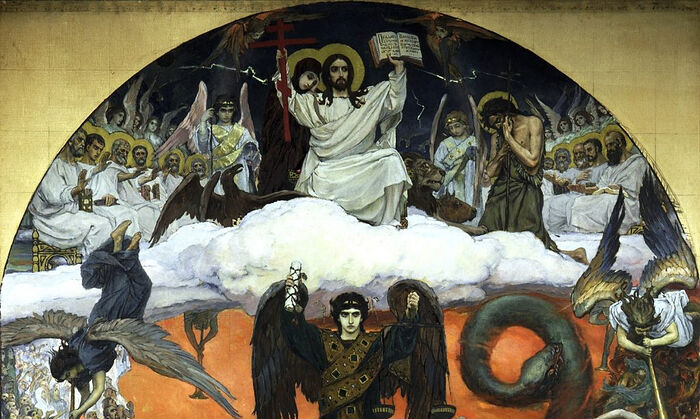 Viktor Vasnetsov, The Dread Judgment, St. Vladimir’s Cathedral in Kiev
Viktor Vasnetsov, The Dread Judgment, St. Vladimir’s Cathedral in Kiev
But what will happen? For those who loved Christ, who sought Him and purified themselves, this coming will be a cause of inexpressible joy, a great blessing, the contemplation of God in love. And conversely, those who didn’t love Christ, who didn’t desire or seek Him, will see Him. But the sight of Him will scorch them, will turn into pain, turn into sadness, into opposition, into hell and eternal torment. Everyone will see Christ; all people, including those who crucified Him, who nailed Him to the Cross and pierced His side with a spear. And all kindreds of the earth shall wail because of Him. When we see Christ coming with the clouds, then we will all weep: some out of love and joy at the sight of their beloved Lord Jesus Christ, Who comes that we might live with Him forever, and others out of pain and sorrow, because at that moment we’ll understand what we have done, but that nothing can be done to change it. Even so, Amen. Truly it will be so, says the Apostle.
Verse eight: I am Alpha and Omega, the beginning and the ending, saith the Lord, Which is, and Which was, and Which is to come, the Almighty (Rev. 1:8). Which is, and Which was, and Which is to come, the Most Holy Trinity—Father, Son, and Holy Spirit, the almighty God. God is the beginning and end of everything. Everything begins and ends in God—holy deeds, good deeds that will remain. And what doesn’t begin in God and doesn’t end in God is lost, it passes away. When a man builds upon a vain and perishable foundation, then everything will be lost, nothing will remain. What you build in God will remain. The alms you gave, the good deeds you did, the kind words you uttered, the penitent prayer, all the labors for God’s sake—these will remain. What begins and ends in Christ remains. Christ is the beginning and end. And our life, my brothers and sisters, should be like this. Our day, from the moment we open our eyes to the moment we close them, should begin and end with the invocation of the name of our Lord Jesus Christ.
Thus our life acquires meaning, acquires content, acquires another state. When a man lets Christ into his life, everything changes, everything acquires a taste, everything acquires color, everything is sanctified. Christ brings all this into our lives. But take God out of your life and you’ll see that you find no peace or joy in anything; everything is tasteless. When a man loses his taste sensations, you can give him the best food, the best dessert and he doesn’t taste anything. He has lost his sense of taste. Christ is the Alpha and Omega.
We must remember this and begin our deeds with this thought. Let us not be afraid of good deeds. God is rich; He’s an aristocrat and sovereign, not a poor man like you and I. When God sees you doing good for His sake, He rewards you a thousandfold, both now and in the future. We always see it. God may delay, but He never leaves us without recompense. God comes and rewards the good deeds that will remain in eternity. Sometimes we see how a man leaves this world, and we think: What did he take with him in the end? Condemnation, indignation towards his neighbor? The pain he caused people with his injustice and cruelty? His tactlessness and insolence? His greed and voracity?
What does a man take with him? He will take his good and kind deeds; and if he has good holy deeds now and again, deeds of love, they will accompany him together with the prayers of those whom he has treated kindly. The rest will become a heavy chain for his soul; it can’t go with him, but will, conversely, drag him down.
Let’s stop here on verse eight. I’ll try to go through the text quicker; I won’t stop as long as before, so we can take a panoramic look at this most beautiful icon that the Revelation of the Apostle and Evangelist John paints for us. It’s a very beautiful book—the most beautiful! Blessed are those who read and hear the words of this prophecy. And it will be wonderful to see before you what the Apostle John saw.

